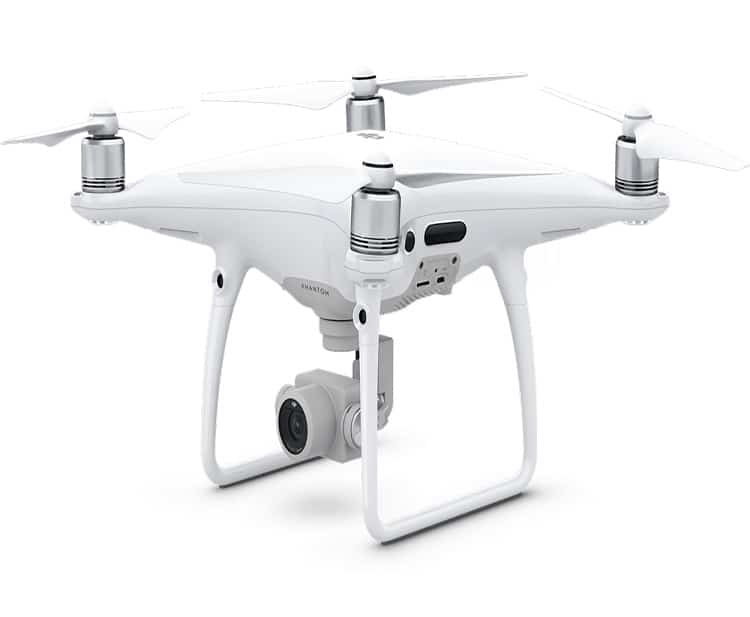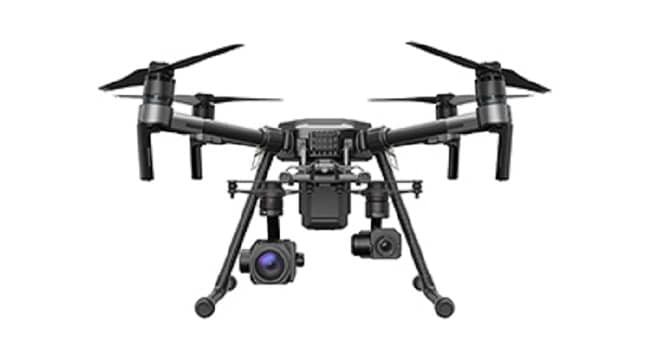DJI’s Phantom 4 V2.0 and RTK Controllers, ZenMuse XT2, and Skyport Adapter
BY Zacc Dukowitz
20 April 2018Never one to slow down, DJI has launched a few new products recently, and there has also been some buzz about two upcoming controller releases for the Phantom 4.
Let’s start with the buzz, and then take a look at the launches.
V2.0 and RTK Controllers for the Phantom 4
We’re calling this news buzz because some of it hasn’t yet been substantiated. According to recent reports, DJI has received approval from the FCC for what seem to be two new Phantom 4 controllers—a V2.0 and an RTK controller.

The FCC filing that is purportedly for the V2.0 controller mentions a PH4-5870mAh–15.2A battery, which is the same battery used in the Phantom 4—thus the speculation that the new FCC approval is for a Phantom 4 Pro V2.0 controller.
However, some are speculating that this filing could be for a Phantom 5 controller instead, which would certainly be big news. The Phantom 4 Pro was released April 30, 2017, so it wouldn’t be crazy to think that a Phantom 5 release might be just around the corner.
Unlike the buzz about the new Phantom 4 or Phantom 5 controller, news about the Phantom 4 RTK controller—the second controller for which there is an FCC filing—isn’t speculative. DJI has acknowledged the creation—and subsequent FCC approval—of the Phantom 4 RTK.
RTK stands for Real-Time Kinematic. This new version of the Phantom 4 can create highly accurate maps—up to 2 inches / 5 centimeters of accuracy—using GNSS satellite positioning. (To put this in perspective, many drones only offer accuracy of up to about 16.4 feet / 5 meters, making RTK much more accurate by comparison.)
The RTK drone can be used to accurately map assets in industrial settings, including mapping for stockpiles, construction sites, or buildings. It’s clearly aimed for use in the commercial market, which is of course where we’re seeing a lot of growth in the drone industry lately.
DJI requested a 45-day secrecy cycle for both of these FCC filings, so we should expect to start seeing some official releases before too long.
The ZenMuse XT2 and the Skyport Adapter
The ZenMuse XT2
Both of DJI’s new releases are also aimed directly at the commercial drone market.
The ZenMuse XT2 is a dual vision thermal camera that was released recently at the headquarters of the Menlo Park Fire Department in Menlo Park, CA.
The ZenMuse XT2 combines both thermal and visual sensors.
The visual camera comes with 4K video and 12mp stills from its 1/1.7” CMOS sensor, and both the visual and thermal camera can record and stream at the same time.


Having this combination of cameras allows firefighters and others to compare a live feed with a thermal one in real time, and make crucial tactical decisions on how to respond to a fire as it unfolds.
It also promises to be useful for thermal inspections, since drone pilots can now see what they’re looking at through the visual camera, as well as doing the thermal inspection through the thermal camera.


A Rendering of the ZenMuse XT2 in Action
The XT2 was created in partnership with FLIR, and can be mounted on any of DJI’s M200 Series and the M600 Pro.
The ZenMuse XT2 continues our longstanding partnership with FLIR to create the most powerful thermal imaging solution available on a drone today. This is a significant advancement for public safety professionals who are using drones to save lives.
– Jan Gasparic, Head of Enterprise Partnerships at DJI
The Skyport Adapter
In another release aimed at the commercial sector, DJI recently launched the SDK and Skyport Adapter, which will allow third party cameras, sensors, and other payloads to be mounted and integrated with DJI M200 drones.


This release essentially creates an open platform on which any developer can work to address the specific needs of a company in a given industry, and helps give DJI yet another competitive advantage by allowing their drones to have the flexibility to address various new scenarios, without investing in creating specific drones for every single niche application that arises.
Our new Payload SDK makes it possible for any manufacturer to create a payload specific to their customers’ needs that will work seamlessly with DJI’s aircraft.
– Jan Gasparic, Head of Enterprise Partnerships at DJI
At the end of March, DJI announced their biggest single order of drones yet: an order of 1,000 M100s for the Japanese construction company Komatsu. These drones were being sold in partnership with SkyCatch, a U.S.-based company that will customize the M100 before delivery.
With the release of the Skyport, it seems like we can only expect to see more of these partnerships and customizations, with DJI providing the initial hardware, and other companies customizing that hardware to fit specific customer needs.


